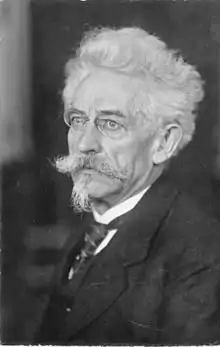Adolph Hoffmann
Johann Franz Adolph Hoffmann (23 March 1858 – 1 December 1930) was a German socialist politician and Prussian Minister for Science, Culture and Education.

Born in Berlin, Hoffmann worked as an engraver, and then as a gilder. He joined the Social Democratic Party of Germany, and from 1890 was the editor of local socialist newspapers, then in 1893 became a book dealer. He was known for his opposition to the ways in which Christianity was practiced by the wealthy, and was nicknamed "Ten Commandments Hoffmann" as a result.[1]
In 1900, Hoffmann was elected to Berlin City Council, in 1904 to the Reichstag, and in 1908 to the Prussian Diet. In 1916, he was elected as chair of the Berlin SPD, but he opposed World War I and so joined the Independent Social Democratic Party of Germany (USPD) split, becoming its chair, until 1918. In 1920, he was re-elected to the Reichstag, and he became co-chair of its left-wing faction, which he led into the Communist Party of Germany (KPD). He was elected to the KPD's central committee, but resigned in 1921 in sympathy with Paul Levi. He followed Levi into the Communist Working Group, the USPD, and then the SPD. He lost his seat in the Reichstag in 1924, and stood down from the city council in 1928.[2]
References
- Gernot Bandur: Hoffmann, Johann Franz Adolph . In: History of the German labor movement. Biographical Lexicon . Dietz Verlag, Berlin 1970, pp. 216-217.
- Morgan, David W. (1975). The Socialist Left and the German Revolution. Ithaca: Cornell University Press. p. 462.